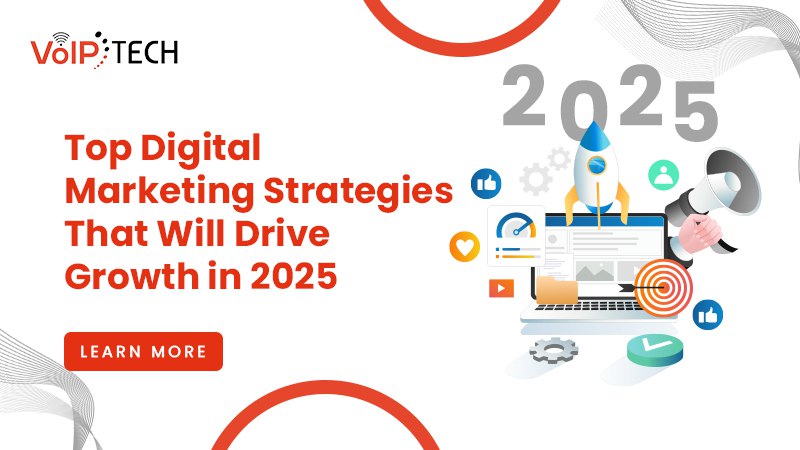Top Digital Marketing Strategies That Will Drive Growth in 2025

As the digital landscape continues to evolve, businesses
need to stay ahead of the curve to remain competitive. In 2025, digital
marketing will be more dynamic, data-driven, and customer-centric than ever
before. To help you prepare for the future, here are the top digital marketing
strategies that will drive growth and success in 2025.
1. AI-Powered Personalization
Artificial intelligence (AI) is revolutionizing how
businesses engage with their audience. In 2025, AI will play an even bigger
role in personalizing marketing strategies. From chatbots and predictive
analytics to personalized email campaigns and product recommendations, AI will
allow brands to deliver tailored experiences in real-time.
Why it works: Consumers expect personalized
experiences that meet their needs and preferences. AI enables businesses to
understand and predict customer behavior, resulting in more relevant and
impactful marketing efforts.
2. Voice Search Optimization
With the increasing popularity of smart speakers and voice
assistants, optimizing for voice search will be essential. By 2025, voice
search is projected to account for a significant portion of search engine
queries, making it crucial for businesses to optimize their content for
voice-based searches.
Why it works: Voice search queries tend to be more
conversational and natural, meaning businesses need to adapt their SEO
strategies to include long-tail keywords and optimize for local searches.
3. Interactive Content
Interactive content, such as polls, quizzes, surveys, and
augmented reality (AR) experiences, is gaining traction. In 2025, we’ll see
even more engagement through content that invites users to participate rather
than passively consume.
Why it works: Interactive content increases user
engagement, encourages social sharing, and provides valuable insights into
customer preferences. It also fosters stronger connections between brands and
consumers.
4. Influencer Marketing Evolution
Influencer marketing will continue to thrive, but it will
evolve. In 2025, micro and nano-influencers will dominate the scene. These
influencers may have smaller followings but boast highly engaged, niche
audiences. Brands will focus on building authentic, long-term relationships
with influencers rather than one-off partnerships.
Why it works: Authenticity is key to successful
influencer marketing. Consumers trust influencers who seem relatable and share
real experiences. As a result, businesses will see better engagement and higher
ROI when collaborating with smaller influencers who align with their values.
5. Video Marketing and Live Streaming
Video marketing is not new, but its importance will continue
to grow. In 2025, video content will remain a central part of digital marketing
strategies, with live streaming taking a more prominent role. Whether it's for
product launches, behind-the-scenes glimpses, or Q&A sessions, live
streaming offers real-time interaction and builds deeper relationships with
audiences.
Why it works: Video content grabs attention and
communicates messages quickly and effectively. Live streaming, in particular,
offers authenticity and transparency, which strengthens consumer trust and
loyalty.
6. User-Generated Content (UGC)
User-generated content (UGC) is expected to take center
stage in 2025. Brands will encourage customers to create content that showcases
their products and services, helping to build social proof and increase brand
credibility. UGC can include anything from reviews and testimonials to social
media posts and unboxing videos.
Why it works: UGC boosts credibility and trust
because it reflects real experiences from real customers. People are more
likely to trust their peers' opinions than traditional advertising, making UGC
an invaluable marketing tool.
7. Omnichannel Marketing
Consumers now interact with brands across multiple
touchpoints – from social media platforms to email and mobile apps. In 2025,
businesses will need to provide a seamless omnichannel experience, where customers
can transition smoothly between online and offline channels.
Why it works: Omnichannel marketing ensures a
consistent brand experience no matter where or how customers engage with your
business. It helps drive customer loyalty by making it easier for them to
interact with your brand on their terms.
8. Sustainability and Ethical Marketing
As consumers become more eco-conscious, businesses will need
to align their marketing efforts with sustainability and ethical practices. In
2025, brands that prioritize environmental responsibility and social causes
will stand out, as consumers will actively seek out companies that reflect
their values.
Why it works: Consumers increasingly want to support
brands that care about the environment and social justice. By incorporating
sustainability into your marketing efforts, you not only appeal to this growing
consumer base but also build brand loyalty based on shared values.
9. Data Privacy and Transparency
With increasing concerns about data privacy, transparency
will become a key differentiator for brands in 2025. Businesses will need to be
clear about how they collect, use, and protect customer data. Building trust
through ethical data practices will be crucial for long-term success.
Why it works: Consumers want to know that their data
is being handled responsibly. Brands that prioritize transparency and data
protection will earn the trust of their audience, leading to higher customer
retention and loyalty.
10. Chatbots and Automation
Automation, especially through AI-powered chatbots, will
become an essential tool in digital marketing. In 2025, chatbots will handle
customer service inquiries, sales, and personalized recommendations, allowing
businesses to scale their operations and provide faster, more efficient
service.
Why it works: Automation increases efficiency and
reduces human error. Chatbots can provide immediate responses, enhance customer
experiences, and drive conversions – all while reducing operational costs.
Digital marketing in 2025 will be defined by innovation,
personalization, and the ability to adapt to rapidly changing consumer
expectations. To stay ahead of the competition, businesses must embrace new
technologies, understand their audience on a deeper level, and deliver
seamless, personalized experiences across multiple channels. By incorporating
these strategies into your marketing plan, you’ll be well-positioned for
success in the years ahead.



